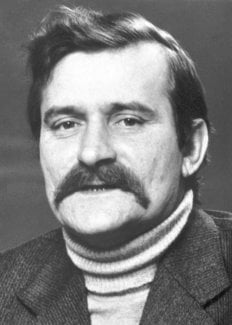Lech Wałęsa
Biographical

Lech Wałęsa was born on September 29, 1943 in Popowo, Poland. After graduating from vocational school, he worked as a car mechanic at a machine center from 1961 to 1965. He served in the army for two years, rose to the rank of corporal, and in 1967 was employed in the Gdansk shipyards as an electrician. In 1969 he married Danuta Golos and they have eight children.
During the clash in December 1970 between the workers and the government, he was one of the leaders of the shipyard workers and was briefly detained. In 1976, however, as a result of his activities as a shop steward, he was fired and had to earn his living by taking temporary jobs.
In 1978 with other activists he began to organise free non-communist trade unions and took part in many actions on the sea coast. He was kept under surveillance by the state security service and frequently detained.
In August 1980 he led the Gdansk shipyard strike which gave rise to a wave of strikes over much of the country with Wałęsa seen as the leader. The primary demands were for workers’ rights. The authorities were forced to capitulate and to negotiate with Wałęsa the Gdansk Agreement of August 31, 1980, which gave the workers the right to strike and to organise their own independent union.
The Catholic Church supported the movement, and in January 1981 Wałęsa was cordially received by Pope John Paul II in the Vatican. Wałęsa himself has always regarded his Catholicism as a source of strength and inspiration. In the years 1980-81 Wałęsa travelled to Italy, Japan, Sweden, France and Switzerland as guest of the International Labour Organisation. In September 1981 he was elected Solidarity Chairman at the First National Solidarity Congress in Gdansk.
The country’s brief enjoyment of relative freedom ended in December 1981, when General Jaruzelski, fearing Soviet armed intervention among other considerations, imposed martial law, “suspended” Solidarity, arrested many of its leaders, and interned Wałęsa in a country house in a remote spot.
In November 1982 Wałęsa was released and reinstated at the Gdansk shipyards. Although kept under surveillance, he managed to maintain lively contact with Solidarity leaders in the underground. While martial law was lifted in July 1983, many of the restrictions were continued in civil code. In October 1983 the announcement of Wałęsa’s Nobel prize raised the spirits of the underground movement, but the award was attacked by the government press.
The Jaruzelski regime became even more unpopular as economic conditions worsened, and it was finally forced to negotiate with Wałęsa and his Solidarity colleagues. The result was the holding of parliamentary elections which, although limited, led to the establishment of a non-communist government. Under Mikhail Gorbachev the Soviet Union was no longer prepared to use military force to keep communist parties in satellite states in power.
Wałęsa, now head of the revived Solidarity labour union, began a series of meetings with world leaders.
In April 1990 at Solidarity’s second national congress, Wałęsa was elected chairman with 77.5% of the votes. In December 1990 in a general ballot he was elected President of the Republic of Poland. He served until defeated in the election of November 1995.
Wałęsa has been granted many honorary degrees from universities, including Harvard University and the University of Paris. Other honors include the Medal of Freedom (Philadelphia, U.S.A.); the Award of Free World (Norway); and the European Award of Human Rights.
| Selected Bibliography |
| By Wałęsa |
| The Struggle and the Triumph. New York: Arcade, 1992. |
| A Way of Hope. New York: Henry Holt, 1987. |
| Other Sources |
| Craig, Mary. Lech Walesa and His Poland. New York: Continuum, 1987. (By a popular writer who knows Poland well. Based on extensive research and interviews with Wałęsa and others. Covers the period through 1986. Highly recommended.) |
| Goodwyn, Lawrence. Breaking the Barrier: The Rise of Solidarity in Poland. New York: Oxford University Press, 1991. |
| Kurski, Jaroslaw. Lech Walesa: Democrat or Dictator. Boulder, Colorado: Westview Press, 1993. (Translated by Peter Obst. The period July 1989 to March 1992. By Wałęsa’s press spokesman, whose purpose is “to portray Lech in motion”.) |
This autobiography/biography was written at the time of the award and first published in the book series Les Prix Nobel. It was later edited and republished in Nobel Lectures. To cite this document, always state the source as shown above.
Nobel Prizes and laureates
Six prizes were awarded for achievements that have conferred the greatest benefit to humankind. The 14 laureates' work and discoveries range from quantum tunnelling to promoting democratic rights.
See them all presented here.
